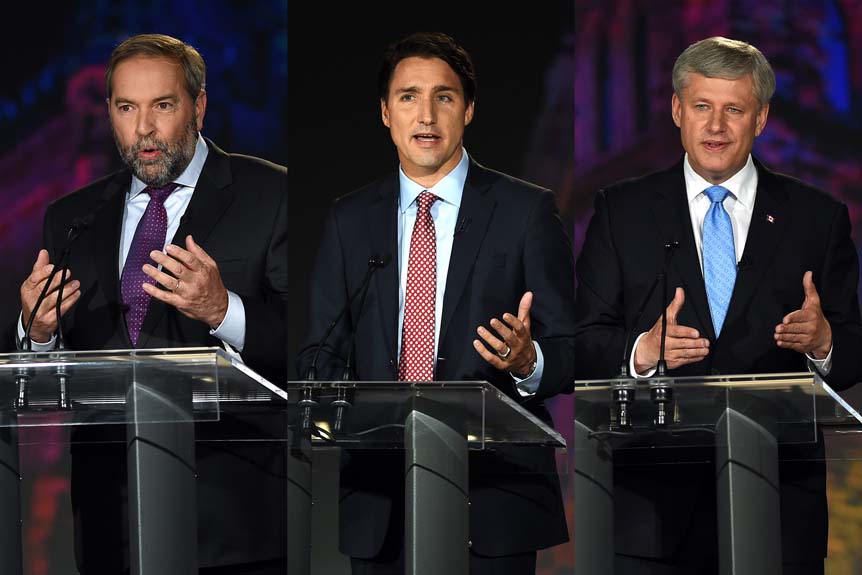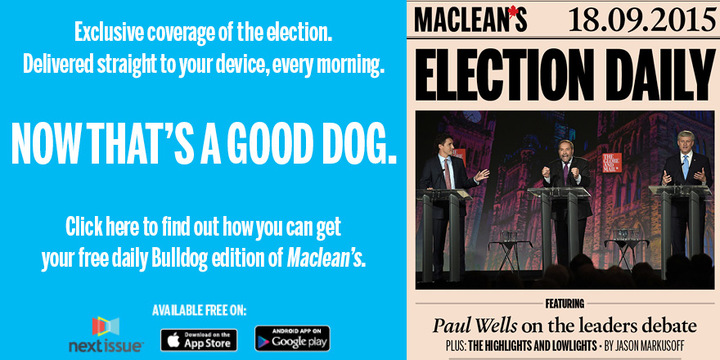A debate on the economy, etc.
A dry debate about trade deficits the event in Calgary wasn’t, but nor was it a focused one
From left to right, NDP Leader Tom Muclair, Liberal Leader Justin Trudeau, and Conservative Leader Stephen Harper are seen at various points during the Globe and Mail leaders’ debate, in this photo illustration, on Thursday, September 17, 2015. THE CANADIAN PRESS/Sean Kilpatrick
Share

This was a debate on the economy, and pipelines, and refugees, and anti-terrorism laws, and the appropriateness of pot jokes that contribute imperceptibly little to Canada’s gross domestic product.
And amid all the Globe and Mail debate’s flurry of topics and ventures off-topic, the leaders also had 85 precious minutes to repeat as many attack points as they could against their two rivals.
Nine times, a game-show bell and moderator David Walmsley curtailed exchanges and moved the discussion to another issue: immigration, energy, housing, taxation, the NDP record.
A dry debate about trade deficits this wasn’t. But nor was it a focused one.
Tangled tightly in a stubborn knot of polls for nearly two weeks, Stephen Harper, Justin Trudeau and Tom Mulcair all came into the debate with more urgency and bite than they did at the Maclean’s forum, held so long ago that there could have been a typical-length election period in the interim.
Last time, Harper reprised his familiar role as the unflinching giant. Some in the Conservative base wanted to see Harper the scrapper, who spoke in lightning bolts to his thunderstick-wielding faithful at a Calgary rally this week. He mixed in his prime ministerial posture with more of those finger thrusts and doom-saying about Trudeau’s deficit plan and Mulcair’s social programs and corporate tax increases. “These are risks we cannot afford and they are not good for our homeowners,” he said.
The Conservative leader also tackled Trudeau’s assertion that “confident, optimistic” countries invest to grow their economies. “I actually think this is what Canadians fear: We don’t measure our level of optimism through our level of spending,” Harper said.
Tom Mulcair played the wide-eyed, serene warrior last month, and this time came armed with more sound-bite zingers like: “The Prime Minister wants to hit the snooze button while Mr. Trudeau is hitting the panic button.” His eyes widened with a different sort of flash at some points Thursday, like when Harper accused him of heading to the United States to argue against energy sector jobs and the Keystone Pipeline — Mulcair insisted with frustration he was trying to preserve domestic refining jobs.
The NDP leader also gave the coarsest line of the night, taking Trudeau’s casual reference to smoke puffs into a quip on marijuana use: “You know a lot about that, don’t you Justin”—a rare moment when the Liberal leader could portray himself as above it all.
Trudeau had ankle-level expectations to overcome at the Maclean’s debate, and his performance appeared to be the prelude for the Liberals’ rise in the polls. Now, with predictions of deficits to defend, he tried to build more momentum with frequent interruptions to get his points in, as the Liberal and New Democrat argued over whether corporations or high-income earners were more deserving of tax increases.
Against Harper, he tried to pose the classical question about whether Canadians were better off than 10 years ago. “If you think the economy is doing great, Mr. Harper is your guy,” he said.
He could have resisted Mulcair’s poke on Bill C-51, but he felt compelled to join the off-topic diversion and defend on an issue which has split his Liberal base.
The Syrian refugee crisis was also drawn into the fray, with Harper saying rivals would recklessly throw open Canada’s doors to potential security threats, and offering a perplexing line that new arrivals and “old stock” Canadians liked a tight line on health care for refugee claimants.
On top of separate attacks, each leader also tried to tie one rival to the other: Trudeau, saying both opponents were stuck in a balanced budget groove, Mulcair, by saying his foes loved corporate tax giveaways and have corruption-strewn records, and Harper, by saying only he could preserve the economy from permanent problems. “Liberal and Tory, same old story,” is an old NDP refrain—in a surprisingly close campaign, the leaders are trying to come up with newly contorted rhymes.
Walmsley relished the chance to play British presenter provocateur in a British presenter style, accusing Harper of grimacing at one point and saying he’d knock the leaders off their talking points. It proved tricky.
At the end, Trudeau lamented that there wasn’t a chance to discuss Aboriginals and the economy. Perhaps they will find room in the upcoming debate on foreign affairs.
